I must admit that it’s hard to write about the things that give meaning to my life while the world continues plunging into more chaos and tragedy, but I’ve made a commitment to lift up positive possibilities in the midst of what is very dire. After taking in only a brief dose of today’s version of dismal news, I was excited to read Margaret Killjoy’s Substack report from one of the main hubs of climate disaster (Asheville, NC); she shares stories about how humans are reacting and organizing themselves like a healthy immune system. Despite the hideous leaders with only destruction and fear mongering on their minds, there is a tendency for humans to behave like beneficial bacteria in a crisis. Remember what Rebecca Solnit said in her crucial book, A Paradise Built in Hell: The Extraordinary Communities that Arise in Disaster? Killjoy’s report, among others I’ve read on social media, makes my heart leap with optimism and gives me more motivation to write through all that we are carrying.
And then a friend sent me this poem, a poem that I had just read an hour earlier, and that synchronicity made me want to share it with you. Atwood spends more time with catastrophe than I am wont to do these days (for multiple reasons), but I’ve respected her writing for decades.
Poem by Margaret Atwood, reprinted in Orion Magazine from her recent poetry book, Paper Boat, 2024.
Before I share who and what is featured in the photo on the top of this post (yes, a cliff hanger in the second paragraph), I want to tell you about the very humble grief rituals we facilitated at Eden Reframed, the ecoart project that we are slowly dismantling on Vashon Island, and an encounter with our buzzing cousins. During our first ritual for the closing of my eco-art project, we saw that a paper wasp hive recently photographed by new friend, Franklin Abbott, earlier in September, was still occupying one of the cubby holes in the story hive. This variety of wasp tends to be very irritable, and sometimes aggressive if there’s any activity near them, so our plans to remove mementos from the story hive had to be postponed. The energy of the wasps moving in and out was palpable, and none of us wanted to test their patience. So we drummed and rattled around the perimeter of the garden, offering blessings to all the plant kin and critters who had been nourished by Eden Reframed all these years.
Our second ritual, less than a week later, after a big rain and many cooler nights, demonstrated that the paper wasps are very resilient. Their home, bigger than a human head, was still intact and busy with activity.
We met with two kind members of the Vashon Parks staff, Shawn and David, who assisted us in removing the large sign at the entrance to the garden. Some photos/videos documenting that process are below. The rusty and graffitied sign now leans against the wall between two of Bob’s columnar apple trees in our canoe garden in Tacoma. Shawn and David told me that there will be a pickle ball court adjacent to Eden Reframed’s site, but they will keep the fruit trees and berry bushes in place (at my request) to provide snacks for those who need sustenance while they recreate. They also told us that a food truck comes to the park every day during the summer months with free lunches for the youth who use the skate park and the disc golf course.
I was super grateful to have former Island resident, Stephen (writer, editor, and filmmaker of the film, BIG JOY) at my side during this second ritual. The first ritual included my friend of 58 years, Annie, and my coven sister, Carol, and Deborah (itinerant Island resident) who was once one of Bob’s cohort in his Vashon-based non-profit, SEEDS. The company of these particular individuals offered grace in the midst of this grieving time.
David kindly went home to get his metal grinder so that I could fit the sign in my car, and thanks to the strength training I’ve been doing weekly, I had no trouble lifting this heavy piece of metal and placing in the backyard (the house that is visible beyond the fence is not mine, btw).
We discussed a plan for exploring the story hive’s treasures at a later date; I want to grab the log book and whatever remains of the wooden story cards, assuming that there are still some in there. I’m returning to the Island on the 18th to participate in a weekend long grief retreat. If the wasp nest has been vacated by then, I will take it home to place on the altar in the Zendo. We will also dig up the lilac bush planted in honor of my former student and friend, Ricky Greene, and transplant it within my permaculture designed garden so I can continue honoring his spirit at home. Ricky taught art for social change in LA middle schools and died of COVID in late 2020. Just before his illness, he was planning to move to Vashon Island. Ricky had a glamorous life; he lived in the Chelsea Hotel in the 70s and was good friends with Patti Smith and Iggy Pop. He performed drag burlesque with the Cockettes in San Francisco in the early 80s. When he was my student at CSULB (early 90s), the LA uprising occurred (due to the verdict surrounding the Rodney King case), and the chaos on his block caused him to flee his apartment. We offered him refuge in our Long Beach apartment for a week, bonding us deeply. I remember going to hear Jesse Jackson speak at a local Black church in the midst of the crisis. After my book, Arts for Change, came out, Ricky looked me up on the internet and wrote that he was excited to use this book to guide his work with his art classes. I was thrilled to hear this and got to see him in person in LA in 2018 (the photo below was taken then on Venice Beach).
Memorial photo honoring Ricky Green and the planting of his lilac bush at Eden Reframed (2021).
Now to explain the top photo in this post. For those of you who do not know the The Beehive Design Collective, you need to spend some time with their amazing illustrated banners and posters, both of which are well explained on their website.
In the photo above, you can see Sakura Bee and Darius Bee, a brilliant and energetic couple who’ve been on the road for months with their two young kids. They recently came to Tacoma as part of their amazing, whirlwind continental tour. Part of what makes this visit so extraordinary is that it comes as a revival of a practice that was in hiatus for a number of years.
I first encountered the Bees in the late 90s, when Bob and I were teaching “activist art in community” at the Institute for Social Ecology in Vermont. We learned about their work from a former student who had collaborated with the Bees on posters and banners that were being used in the global justice movement for protests and educational work. They came into our sessions to do “Canta Historia,” a cultural tradition with Medieval origin where bards & other performers would arrive in a village with puppets or images on rolling scrolls to teach the illiterate masses via allegory, myth, or biblical story how to behave, usually according to rules and dogma of the high church. The Bees have other intentions when they sing and rap the complex stories minutely and beautifully illustrated in their banners and large posters. https://beehivecollective.org/tours-booking/workshops-and-presentations/ Because their illustrations are so layered, on top being well researched and thought out, they really require deconstruction from skilled performers who can animate and engage audiences with their meaning.
Once we had moved to the West Coast, I was grateful to hear whenever the Bees went on tour. Over the years, different Bees paid visits to my classes at UW Tacoma. At some point, their founder had purchased a house in Machias, Maine (I believe it was a former grange) where they built a working studio, stored their archive, and did outreach in the surrounding rural community. They had big carnivalesque galas there, with local bands and dances, and became a serious hub for art activism. During that time, some of the Bees continued doing educational work in the Global South, particularly in Colombia where their Plan Colombia had been meticulously researched and developed. But despite raising funds through various festivals and gatherings, they lost their physical hub in Maine a few years ago due to some kind of financial mishap. After that, it seemed that the Bees went into hibernation.
So this resurrection of the Bees on tour was truly a fabulous thing to witness; this family of Bees on the road includes Sakura and Darius, featuring their oldest son collaborating in the rap poetry describing the history described in The True Cost of Coal - a poster that has particular resonance given the current climate disaster (did you know that coal companies practicing “mountain top removal” as their “more cost effective” means of mining have blown up 500 mountains in Appalachia?). Sakura & Darius also explained the project MesoAmerica Resiste which examines globalization in the Americas, focusing on resistance to mega-infrastructure projects that are literally paving the way for free trade agreements that devastate local economies and communities. When they came to 350 Tacoma last week, they led a very animated, interactive discussion about the history of the collective and detailed discussions about several of the poster campaigns. They are currently in California and will be in the Bay Area this weekend. For details, email sakura.saunders@gmail.com.
It is definitely encouraging that this collective is getting regenerated by such devoted, passionate, & insightful members. Another creative emergent strategy to sustain our spirits in these challenging times.
In other news: I have a few more essays for Gravity Humming that are still in a draft form; they’ve been that way for a few months now so I’m not sure whether they will hatch anytime soon. Nevertheless, I compiled the 53 essays that I’ve posted here into a makeshift manuscript - it’s currently 170 single-spaced pages - as I get it ready for an editor. To complete the full concept for the book, there’s more material that needs to be birthed and to that end, I’ll be hosting another discussion on Zoom for paid subscribers at the end of the month: Saturday, October 26th, at noon Pacific Time to accommodate folks who live on the other side of the Atlantic.



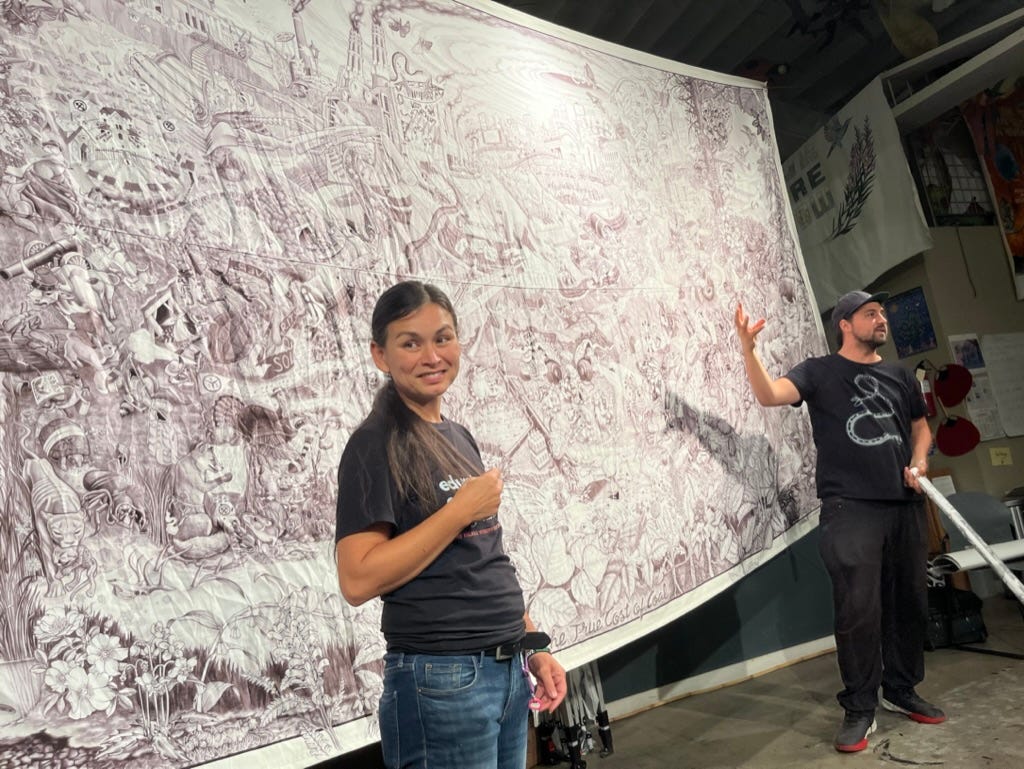


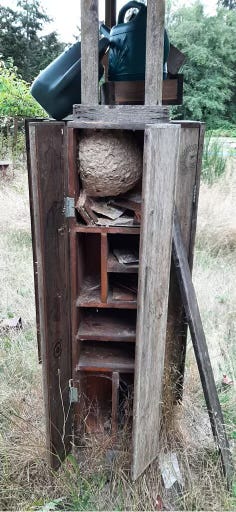

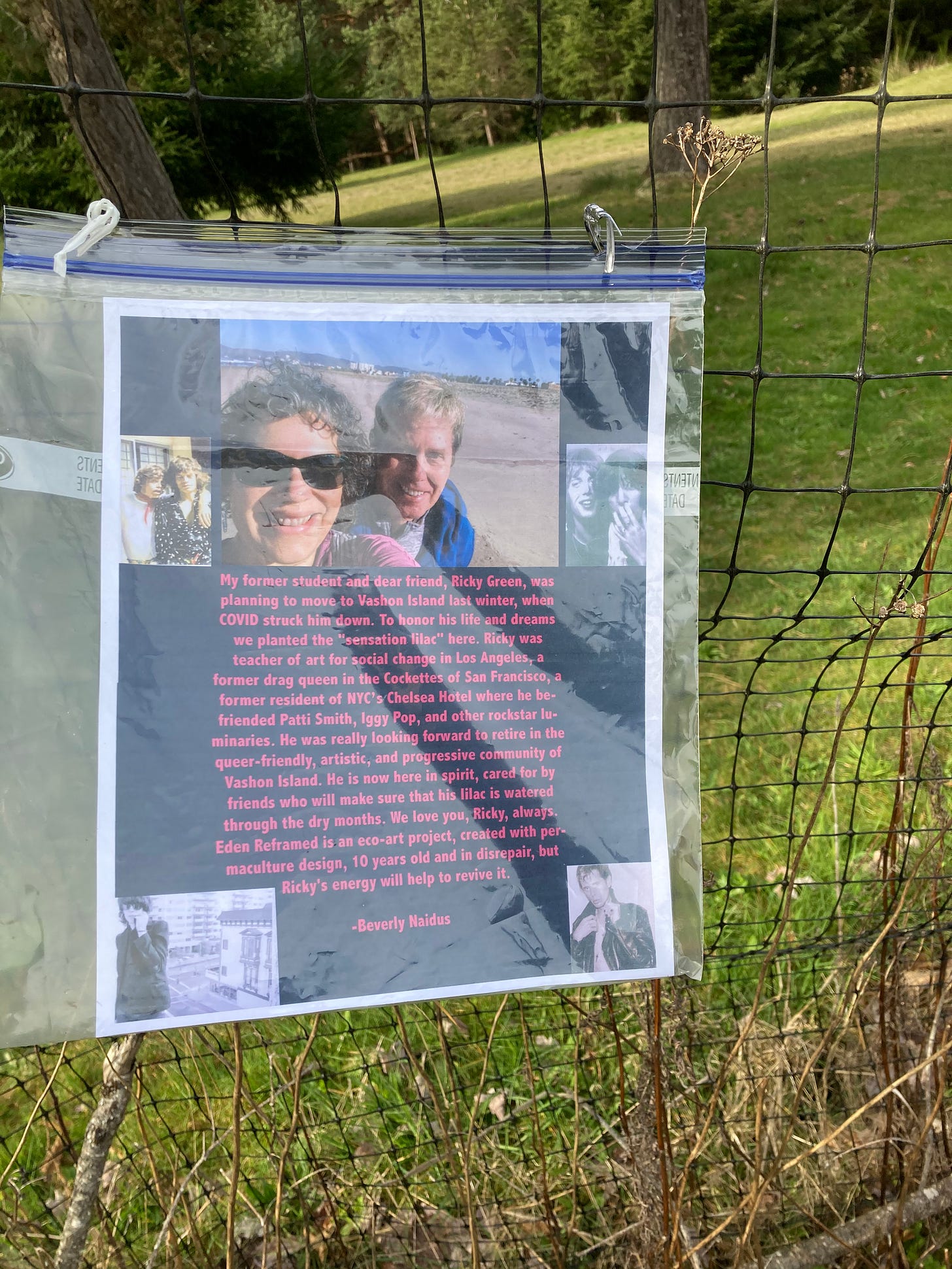
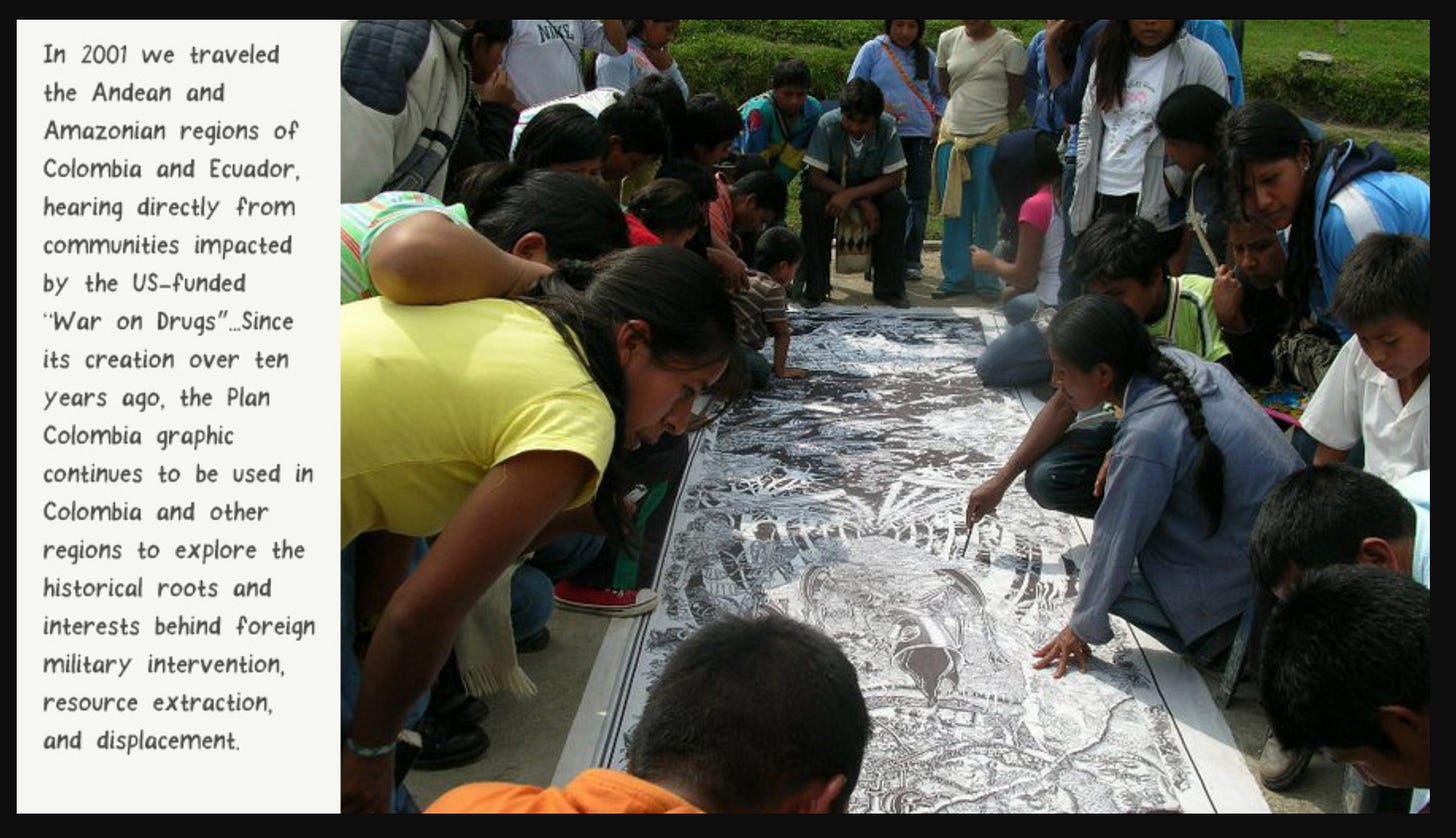
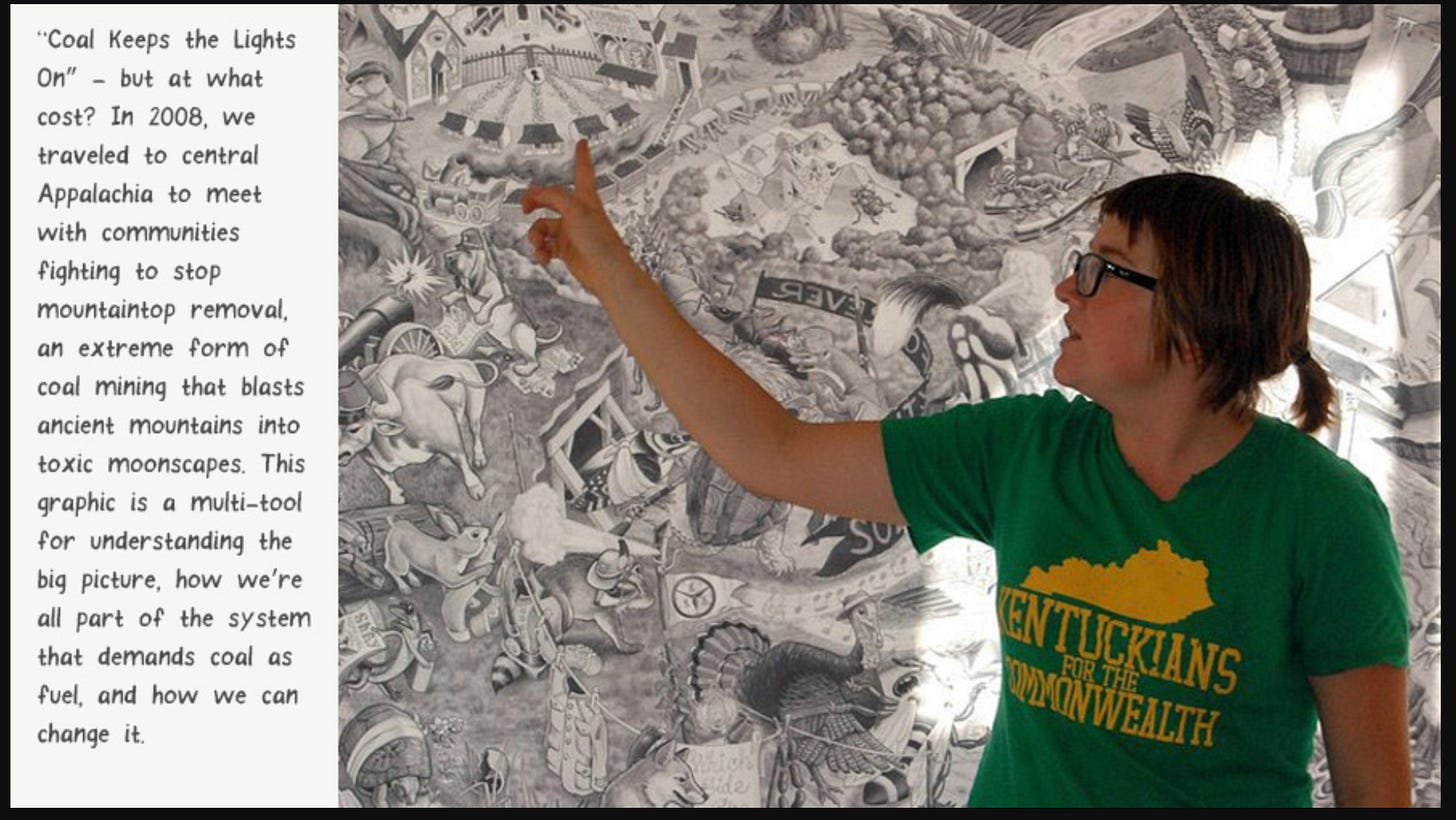
fascinating, uplifting and chock a block full of story telling. I read it all and what a good read, and kinetic, nicely disturbing poem, disturbing me to new wonderment past all their shame. good doomer medicine
i'd like to touch and smell the Ricky Greene lillac bush some day. Thank you for the positive energy today.